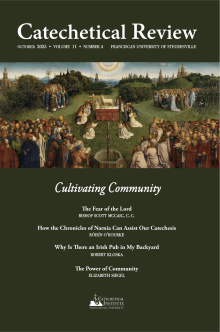“Enabling families to take up their role as active agents of the family apostolate calls for ‘an effort at evangelization and catechesis inside the family.’” The greatest challenge in this situation is for couples, mothers and fathers, active participants in catechesis, to overcome the mentality of delegation that is so common, according to which that faith is set aside for specialists in religious education. This mentality is, at times, fostered by communities that struggle to organize family centered catechesis which starts from the families themselves.
—Directory for Catechesis, no. 124[1]
 Parents. We rely on them to register their kids in our programs, to attend mandatory meetings, and to complete everything needed for sacramental prep. But fundamentally, we don’t trust them. Oh, we trust some of them. For the most part, though, we assume they aren’t reinforcing the faith at home—and have no interest in doing so. After all, they don’t even bring their kids to Mass most of the time. But what if the way we structure our programs encourages the very behaviors we don’t like?
Parents. We rely on them to register their kids in our programs, to attend mandatory meetings, and to complete everything needed for sacramental prep. But fundamentally, we don’t trust them. Oh, we trust some of them. For the most part, though, we assume they aren’t reinforcing the faith at home—and have no interest in doing so. After all, they don’t even bring their kids to Mass most of the time. But what if the way we structure our programs encourages the very behaviors we don’t like?
Our policies and procedures, our attitudes and approaches reveal that we don’t really believe parents can be the primary educators of their own children. Regardless of what the Church actually teaches about parents and the domestic church, we pastors, directors of religious education, and catechists all fail to trust. If we even allow at-home formation, frequently we don’t allow it in a sacrament year. When it really matters, we don’t have faith that parents can do it right.
The Roots of Distrust and the Desire for Control
The reasons for our distrust of parents are many. How do we know that they covered everything they were supposed to cover? How do we know that they taught doctrine clearly and accurately? How do we know that the child received authentic faith from their parents, who aren’t well formed?
It comes down to control, but we often forget how little control we have over what happens in the classrooms on our campus. Even a well-formed catechist with an excellent lesson plan and exciting manipulatives can fail to pass along the faith to every child in the room. How do we ever know everything was covered in a meaningful way for every child? The truth is, we don’t. If that’s the case on our campuses, then why are we so suspect of it happening in our families’ homes? If we ultimately rely on grace to operate in one place, why not in the other as well?
The rest of this online article is available for current Guild members.
[1] Pontifical Council for the Promotion of the New Evangelization, Directory for Catechesis (USCCB, 2020), quoting Francis, Amoris Laetitia, no. 200.
[2] See Jesse Smith, “Transmission of Faith in Families: The Influence of Religious Ideology,” Sociology of Religion 82, no. 3 (Autumn 2021): 332–56, doi: 10.1093/socrel/sraa045; and Rachel Minkin and Juliana Horowitz, “Parenting in America Today,” Pew Research Center (January 24, 2023), www.pewresearch.org/wp-content/uploads/sites/20/2023/01/PST_2023.01.24_parenting_REPORT.pdf.
Art Credit: Family, Flickr.com.
This article originally appeared on pages 37 - 42 of the print edition.
This article is from The Catechetical Review (Online Edition ISSN 2379-6324) and may be copied for catechetical purposes only. It may not be reprinted in another published work without the permission of The Catechetical Review by contacting [email protected]

















